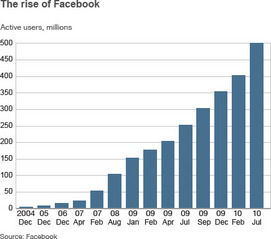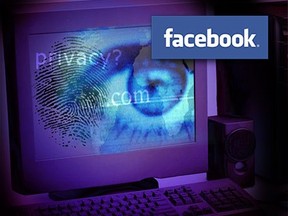Facebook has rapidly developed into the largest and most powerful social networking site on the Internet. With over 500 million active users, Facebook is becoming society's prime tool for communication.
Facebook is in continuous expansion. More than 2.5 million websites have integrated with it and, hence, numerous new features have converged into the one website. Aside from being a supposed online chat room, photo and video management device, calendar and e-mail account, Facebook has incorporated games, news and a search engine, as well as many other features, in attempt to become the one, universal site. In addition, Facebook has converged with new, non-online technologies, such as phones. There are more than 250 million active users currently accessing Facebook through their mobile devices and these people are twice as active on Facebook than non-mobile users. Now that the internet can be accessed from the one device which is always at hand, Facebook is used even more frequently and is, perhaps, reducing the need for SMS and phone calls. Furthermore, Facebook, due to it now being seen as a necessity, is actually promoted by electronic companies, for example Apple in their ads for the iPhone, not to mention the iPad and their other various products.
Many people are drawn to Facebook because of its appearance of immediacy, i.e. it seeming to providing a direct connection with reality. However, the site abundantly demonstrates hypermediacy, primarily through this tendency it has to converge with other technologies.
The question is: is this vast social networking site a positive or negative influence on society?
Facebook is in continuous expansion. More than 2.5 million websites have integrated with it and, hence, numerous new features have converged into the one website. Aside from being a supposed online chat room, photo and video management device, calendar and e-mail account, Facebook has incorporated games, news and a search engine, as well as many other features, in attempt to become the one, universal site. In addition, Facebook has converged with new, non-online technologies, such as phones. There are more than 250 million active users currently accessing Facebook through their mobile devices and these people are twice as active on Facebook than non-mobile users. Now that the internet can be accessed from the one device which is always at hand, Facebook is used even more frequently and is, perhaps, reducing the need for SMS and phone calls. Furthermore, Facebook, due to it now being seen as a necessity, is actually promoted by electronic companies, for example Apple in their ads for the iPhone, not to mention the iPad and their other various products.
Many people are drawn to Facebook because of its appearance of immediacy, i.e. it seeming to providing a direct connection with reality. However, the site abundantly demonstrates hypermediacy, primarily through this tendency it has to converge with other technologies.
The question is: is this vast social networking site a positive or negative influence on society?
Advantages and Disadvantages

The major advantage, or 'pro', of Facebook is the efficient access to communication and information that it provides. There has been a great change in the capacity of information to spread and be consumed over the past decade, which has escalated with the growing numbers of people on social networking sites such as Facebook. More than 30 billion pieces of content (web links, news stories, blog posts, notes, photo albums, etc.) are shared each month. The spread of information is extremely rapid and so the consumption of this information is, consequently, much larger. Hence, using Facebook can be quite an efficient means of remaining 'in the loop'. However, there is a negative side to this rapid spread and large consumption of information. This can be seen with regards to events which often, unintentionally, reach thousands of people, and the consequences can be chaotic. Potentially dangerous 'crazes', such as planking, spread incomprehensibly fast and, as exemplified by the planking death of Action Beale, can, too, provoke disaster. On the other hand, the implications of such an efficient system of circulation and consumption have been extremely valuable to businesses and the marketing industry, in terms of advertising. Naturally, the marketing industry uses Facebook to reach the millions of users and advertise various events and products to this vast audience.
Essentially, Facebook is an extremely useful tool for both businesses and consumers. Businesses can benefit greatly from having access to such a vast audience and consumers can enjoy easily communicating and sharing pictures, videos and so forth with their friends.
Essentially, Facebook is an extremely useful tool for both businesses and consumers. Businesses can benefit greatly from having access to such a vast audience and consumers can enjoy easily communicating and sharing pictures, videos and so forth with their friends.
The beginning of Facebook, not to mention the rest of the Internet, brought with it a new dimension of privacy. In other words, the idea of privacy has been forced to expand so as to account for internet factors. A negative about Facebook is that there are privacy issues associated with the site. The most straight-forward one is that security of account settings are often neglected by users and this can lead to dangerous circumstances concerning stalkers and hackers. A much debated issue concerns the rather questionable privacy settings of Facebook; that is, whether these settings actually work, whether the site can be trusted and whether the members of the Facebook team really have any concern for their users' privacy. The reality of this issue has been confirmed by the fact that Facebook has, in the past, sent personal and identifiable user information to advertisers without consent. Further privacy issues of Facebook include the potential threat of stalkers using the supposed anonymity of Facebook to pose as other people, as well as the unwanted circulation and consumption of personal information (i.e. photos, videos, statuses/comments, personal details etc.).

Another issue of Facebook surrounds the digital divide; that is, the contrast between digital natives, who have grown up with new media technologies (or online technologies such as Facebook), and digital migrants, who were born after the introduction of new media technologies. Digital migrants often tend to be somewhat fearful of new media, due to their unfamiliarity or 'alien' view of it, and as a consequence tend to withdraw, or isolate themselves, from those who use it (i.e. digital natives), creating the digital divide. Facebook may possibly further this separation of generations by causing digital natives to become even more media obsessed and digital migrants to become even more reclusive. The implications of this are digital migrants lacking access to information. However, this is not for all cases. Many digital migrants are using Facebook as much as digital natives.

Addictiveness is another widespread effect of using Facebook and can result in further issues concerning psychological and physical wellbeing. Additionally, the implications of online networking on Facebook are that people can often become super-social online, but anti-social in person.
Further issues of Facebook surround the tendency of information to spread rapidly (i.e. dangerous crazes such as planking, events unintentionally reaching thousands of users, etc.), which was discussed earlier.
Further issues of Facebook surround the tendency of information to spread rapidly (i.e. dangerous crazes such as planking, events unintentionally reaching thousands of users, etc.), which was discussed earlier.
In general, although there are many negatives and issues surrounding the use of Facebook, such as privacy, social implications and so forth, the positives of the site seem to prevail; that is, Facebook has, overall, been more beneficial to society than it has been detrimental. It has provided an efficient and enjoyable means for communication and sharing between networks of people, as well as being an invaluable tool for the marketing industry. Facebook may have issues surrounding it, but these issues are able to be minimised with some work. On the whole, Facebook has been extremely useful in helping society progress and, hence, is a positive influence on society.
REFERENCES
http://www.facebook.com/press/info.php?statistics
nelson media VCE Units 1-4, 2nd Edition, Jo Flack
http://www.facebook.com/press/info.php?statistics
nelson media VCE Units 1-4, 2nd Edition, Jo Flack

